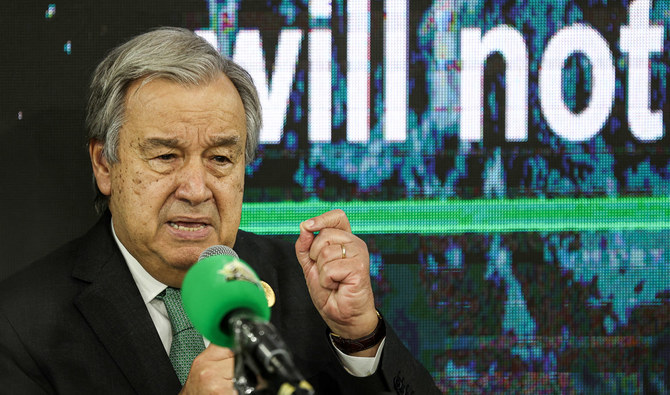ISLAMABAD: United Nations Secretary-General (UNSG) Antonio Guterres said on Monday the International community must “massively support” Pakistan after record-breaking floods, calling on participants at the Climate Implementation Summit in Egypt to define a clear roadmap, including the creation of an institutional framework, to compensate poor nations for mounting damages linked to global warming.
The United Nations Climate Change Conference, or COP27, started on Sunday in the seaside resort town of Sharm el-Sheikh, with delegates from nearly 200 countries. The Pakistani PM Shehbaz Sharif and his team, which includes climate change minister Sherry Rehman, are attending with the aim to use the summit to get the world to commit to helping countries like Pakistan deal with growing climate-related “loss and damage.”
Sharif was last month invited to co-chair COP27 by Egyptian President Abdul Fattah El-Sisi after the Pakistani PM ran an international campaign to raise awareness about climate change in the wake of floods that killed over 1,700 people, affected 33 million, and cost the South Asian nation more than $30 billion in damages.
“If there is any route for loss and damage, it goes to Pakistan as there is loss and there is damage,” Guterres said while addressing a joint news conference with Sharif.
“This COP27 needs to recognize it and needs to define a clear roadmap to deal with it, including the creation of an institutional framework like financing to address the problems of loss and damage,” he said, hoping Pakistan would be able to benefit from such an instrument.
“The international community can support Pakistan through collaboration in our donor’s conference in which we will try to obtain from the international community the massive support the government of Pakistan needs for the rehabilitation and reconstruction of the areas impacted by this tragic event,” the UNSG said.
“My suggestion is that countries like Pakistan should have a way to swap and exchange payments of their debt with investment in the rehabilitation, recovery, and reconstruction from the natural disaster like the one that occurred there,” Guterres said, adding that Pakistan should also get benefits from concessional funding, which it could not due to its status as a middle-income country.
“International financial institutions and G20 should devise a mechanism for this,” he added.
In his remarks, Sharif hoped all participating countries at COP27 had come with the spirit of “climate justice for all.”
“Our journey to recovery will be held back by increasing public debt, rising international energy prices, and no real access to adaptation funds,” he said, adding that countries like Pakistan would be “more exposed and deeply vulnerable” than others.
“For the loss and the damage of the world such gatherings are the only hope,” Sharif said, adding that millions of Pakistanis were going into winter without shelter or livelihood, their fundamental rights.
The premier said according to the Post Disaster Needs Assessment (PDNA), the total estimated damage caused by recent floods in Pakistan was over $32 billion, which was around 10 percent of the country’s GDP.
“Women and children are still looking to us to protect their basic needs as we have mobilized every available resource to the national relief efforts and repurposed all budget priorities including resilience and development funds to the rescue and first-order needs of millions but the gap is much bigger,” the premier added.

















